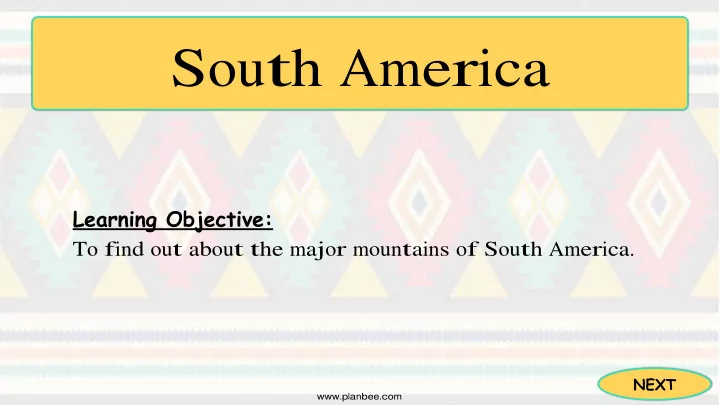

South America Learning Objective: To find out about the major mountains of South America. NEXT www.planbee.com
This is a topographical map of South America. Topographical maps show the physical features of an area, such as rivers and mountains. Can you see where the mountains of South America are? BACK NEXT www.planbee.com
The mountain range that runs down the west side of South America is called the Andes. The Andes is the longest mountain range in the world and one of the highest. It is around 4,500 miles (7,242km) long. The highest mountain in the Andes is Mount Aconcagua which has an elevation of 6,962m. The only mountain range in the world that is higher than the Andes is the Himalayas in Asia. BACK NEXT www.planbee.com
This picture shows the Andes from Santiago in Chile. BACK NEXT www.planbee.com
A view of the Andes from a town in Peru. BACK NEXT www.planbee.com
The Andes are an important part of South American history. One of the most famous historical sites in the Andes is the Inca city of Machu Picchu which was built in the 15th century and abandoned a hundred years later. BACK NEXT www.planbee.com
Why do you think the mountains in South America run as one continuous mountain range instead of having mountains dotted around the continent? BACK NEXT www.planbee.com
The Earth is made up of several different layers. The crust is the top layer which is made up of large ‘plates’ called tectonic plates. These plates are constantly moving. Mountains are formed when the tectonic plates of the Earth’s crust push against each other. BACK NEXT www.planbee.com
This map shows the world’s tectonic plates. Can you see where South America is? How do you think this explains the location of the Andes? BACK NEXT www.planbee.com
Do you know what a volcano is? Do you know how volcanoes are formed? BACK NEXT www.planbee.com
crust Many of the mountains in the Andes are mantle volcanoes. If there are cracks or weaknesses in the Earth’s crust, it allows the magma (rock so hot it has turned to liquid) to escape. This magma then explodes through the crack as a volcanic eruption. outer core inner core The magma builds up in a magma chamber until the pressure is too much and it has to be released. BACK NEXT www.planbee.com
When a volcano erupts, it expels lava (molten rock), ash and gas. Eventually the lava cools to form solid rock. BACK NEXT www.planbee.com
There are three different types of volcanoes: active, dormant and extinct. Active volcanoes are volcanoes that have erupted in the last 10,000 years and that are expected to erupt again. Dormant volcanoes haven’t erupted in that time period but are expected to erupt again some time in the future. Extinct volcanoes are not expected to erupt again. Tungurahua in Ecuador is one of the most active volcanoes in the Andes. Tungurahua Volcano BACK NEXT www.planbee.com
There are four main zones of volcanoes in the Andes: the Northern, Central, Southern and Austral zones. There are many volcanoes in each of these zones. The Andes is home to Ojos del Salado on the border between Chile and Argentina. This is the tallest volcano in the world at 6,893m. Ojos del Salado BACK NEXT www.planbee.com
The Andes are used in lots of different ways by the people who live in the locality. People who live in the Andes use the land for farming so they can grow crops to feed themselves and their families. Not many of the crops that are grown in the Andes are sold commercially. Because the mountains are often too steep to farm, farmers form terraces on the slopes so that they can grow crops more easily. Potatoes and maize are some of the main crops that are grown. BACK NEXT www.planbee.com
Many of the settlements in the Andes are difficult to reach because of the terrain. Llamas and alpacas are often used to help transport heavy goods from place to place. BACK NEXT www.planbee.com
People use wool from llamas to make ropes, rugs and fabric. BACK NEXT www.planbee.com
The Andes also provide many valuable and useful resources, such as gold, silver, gas, coal, iron ore, tin, copper and nitrates. There are many mines in the Andes where these resources are extracted. This is Yanacocha in Peru. It is the largest gold mine in the world. http://commons.wikimedia.org/wiki/File:OperacionesYanacocha.jpg BACK NEXT www.planbee.com
The Andes are also home to many hydroelectric dams. These dams are built so that the energy from flowing water is harnessed as electricity. The energy created by these dams is used locally as well as places further afield. BACK NEXT www.planbee.com
Tourism is an important part of the economy in the Andes. Many tourists visit these mountains every year, most of them to trek, hike, mountain bike or ski in the spectacular scenery. BACK NEXT www.planbee.com
People also travel to the Andes to experience the history and culture. People come to the area to visit the ancient ruins of the Incas, experience the wildlife, see traditional costumes, eat traditional foods and shop at the bustling markets. BACK www.planbee.com
Recommend
More recommend